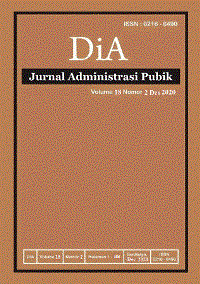EGYPTIAN POLICY BASED ON INSIGHTS OF HISTORY OF MUSLIM MOVEMENT AND SALAFI MOVEMENT
DOI:
https://doi.org/10.30996/dia.v18i2.4352Keywords:
Democracy, Movement, Muslim Brotherhood, Salafi, EgyptAbstract
The aftermath of the Arab Spring was leaving a great turnover for many countries as the regime changed, so does Egypt. As one of the most influential countries both in the Middle East and North Africa, Egypt's domestic politics is quite dynamics since immemorial time, from numerous kingdoms, West colonialism until republic under the authoritarian regime in this modern days. For once, the dynamics of politics itself comes from the grass-root level whichever reached the top such as al-Ikhwan al-Muslimun or Muslim Brotherhood and Salafi Movements which caught people’s attention, not only in Egypt but the entire world. Both basically have religious intentions as it is considered Islamic movements except for their differences in political experience, religious interpretation and manners overpower contestation. Although Egypt currently is controlled by a military coup regime that tends to perpetuate the power, the Brotherhood and Salafi Movements which likewise spread to many countries still lurking and it might be consolidating the power to turn back the democracy to Egyptian who suffer from authoritarian style regime ever since the establishment of the nation after independence from British colonialism. This paper is aimed to describe the policy of the Islamic movement in Egypt which is based on religious intention and the interaction with politics and democratic goal from the nature of establishment, during the Arab Spring and the prospect for Muslim Brotherhood and Salafi Movements as the unrest recently occured.
Downloads
References
Santrock, J.W. (1999). Life span development. 7th edition. Boston: Mc Graw. Diener, E., Lucas, R. E., dan Oishi, S. (2005). Subjective well-being: The science of happiness and life satisfaction. Handbook of positive psychology. NC: Oxford University Press Diener, E. (2006). Understanding scores on the satisfaction with life scales. ________ . (2006). Guidelines for national indicators of subjective well-being and wellbeing, applied research in quality life Diener, E., dkk. (2009). New measures of well-being. Social indicator research series 39. Mehdizadeh, Soraya. (2010). Self-presentation 2.0: Narcissism and self-esteem on facebook. Journal Departemen of Psychology, New York University. Vol 13 no 2, 357364 Prasetyo. (2016). DSM-IV (Diagnostic and Statistical Manual of Mental Disorder – Fourth Edition Text Revision). Washington, DC: American Psychiatric Association Press. Sedikidess, C. (2004). Are Normal Narcissists Psychologically Healthy. Self Esteem Matter. Journal of Personality and Social Psychology, Vol. 87. Zuckerman M., O’Loughlin Ryan E. (2009). Narcissism and well?being: A longitudinal perspective. European Journal of Social Psychology vol 39.
Al Mubarak, K. (2004). Mamoun el-Hodeiby: Judicious leader of Egypt’s Muslim Brotherhood. The Guardian. Retrieved from https://www.theguardian.com/news/2004/feb/18/guardianobituaries
Ar?, T. (2017a). Geçmi?ten Günümüze Orta Do?u: Sava?, Siyaset ve Diplomasi Cilt – I. Bursa, Turkey: Alfa Akademi.
(2017b). Geçmi?ten Günümüze Orta Do?u: Irak, ?ran, ABD, Petrol, Filistin Sorunu ve Arap Bahar? Cilt – II. Bursa, Turkey: Alfa Akademi.
Awadalla, N. (2019). Explainer – Egypt votes on changing its constitution. Euro News. Retrieved from https://www.euronews.com/2019/04/19/explainer-egypt-votes-on-changing-its-constitution
Baker, R. W., Holt, P. M., Goldschimdt, A. R., Hopwood, D. Little, D. P. & Smith, C. G. (2019). Egypt. Retrieved from https://www.britannica.com/place/Egypt
British Broadcasting Corporation. (June 17, 2019). Egypt’s ousted president Mohammed Morsi dies during trial. Retrieved from https://www.bbc.com/news/world-middle-east-48668941
Brown, N. J. (2013). Islam and Politics in the New Egypt. Washington DC, United States of America: Carnegie Endowment.
Burns, E. (1928). British Emperialism in Egypt. London, United Kingdom: The Labour Research Department.
Kolyuncu, D. (2017). From Gamal Abdul Nasser to Abdulfettah El Sisi; The Historical Evolution of Muslim Brotherhood and Democracy in Egypt. Yeditepe Üniversitesi Tarih Bölümü Ara?t?rma Dergisi, 1(1), p. 62-77.
Kurun, ?. (2015). Democratisation in Egypt From A Historical Perspective: Problems, Pitfalls and Prospects. Yönetim ve Ekonomi, 22(1), pp. 183-199.
Lacroix, S. (2016). Egypt’s Pragmatic Salafis: The Politics of Hizb al-Nour. Washington DC, United States of America: Carnegie Endowment.
Meijer, R. (2012). The Muslim Brotherhood and The Political: An Exercise in Ambiguity. In Roel Meijer & Edwin Bakker (Eds.), The Muslim Brotherhood in Europe (pp. 295-320). Hurst, United States of America: Columbia University Press.
Özdal, B. & Karaca, R. K. (2018). Diplomasi Tarihi I – The History of Diplomacy I (3rd ed.). Bursa, Turkey: Dora.
Tamimi, A. (2017). Who was Muhammad Mahdi Akef?. Aljazeera. Retrieved from https://www.aljazeera.com/indepth/features/2017/09/muhammad-mahdi-akef-170925114715311.html
Y?ld?r?m, R. (2014). Politicization of Salafism in Egypt. SETA Analysis, 6.
Downloads
Published
How to Cite
Issue
Section
License
The DiA journal allows authors to retain the copyright of their papers without limitation. Authors may grant publishers non-exclusive publishing rights to publish articles. Granting first publishing rights to publishers also qualifies as unlimited copyright (because there are no restrictions imposed by publishers on author copyright).







